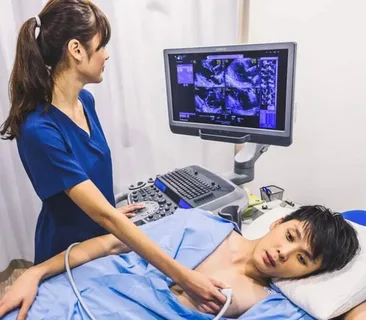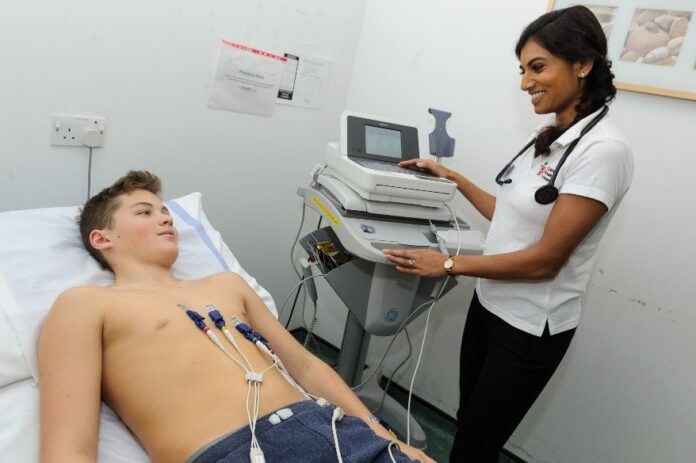Cardiovascular diseases are one of the leading causes of death globally, and early detection is crucial for effective treatment and management. With advances in medical technology, the options for cardiac diagnostics have significantly expanded in recent years. In Sydney, a bustling city known for its cutting-edge medical facilities, there is no shortage of options when it comes to cardiac diagnostics. But who exactly needs these services? In this blog post, we will explore the latest options in Cardiac Diagnostics Sydney and discuss why it is important for everyone to be aware of these advancements.
Understanding Cardiac Diagnostics: A Basic Overview
Cardiac diagnostics refer to the range of tests and procedures used to assess the health of your heart and diagnose any potential cardiovascular issues. These tests play a crucial role in identifying early signs of heart disease, enabling timely treatment and management. Understanding the basics of cardiac diagnostics is essential for everyone, regardless of age or current health status.
One common test used in cardiac diagnostics is the electrocardiogram (ECG). This non-invasive test records the electrical activity of your heart, helping doctors identify irregular heart rhythms and signs of a heart attack. Another commonly used test is the echocardiogram, which uses sound waves to create images of the heart’s structure and function. This test can detect heart muscle abnormalities, valve problems, and blood clots.
In addition to these tests, other diagnostic tools such as stress tests, cardiac CT scans, and cardiac catheterizations may be used based on the individual’s specific needs. These tests provide valuable insights into the overall health of your heart, helping healthcare professionals determine the best course of action for treatment and prevention.
It’s important to note that cardiac diagnostics are not only reserved for those with known heart conditions. As cardiovascular diseases can develop silently, undergoing routine cardiac screenings can help detect issues early on, allowing for proactive interventions and lifestyle modifications that can potentially save lives.
In the following sections, we will delve deeper into who might benefit from cardiac diagnostics in Sydney, the latest advancements in these diagnostic techniques, as well as the benefits and risks associated with them. Understanding these aspects will empower you to make informed decisions about your heart health and seek the appropriate diagnostic center for your needs.
Who are the Candidates for Cardiac Diagnostics in Sydney?
Cardiac diagnostics in Sydney are not just limited to those who already have known heart conditions. In fact, anyone can benefit from undergoing cardiac screenings and diagnostics to ensure their heart health.
Individuals who have a family history of cardiovascular diseases are especially encouraged to consider cardiac diagnostics. This includes those with a family history of heart attacks, strokes, or any other heart-related issues. By undergoing these tests, individuals can identify potential risks and take proactive measures to prevent or manage them.
Additionally, individuals who have risk factors for heart disease should also consider cardiac diagnostics. These risk factors include smoking, high blood pressure, high cholesterol levels, diabetes, obesity, and a sedentary lifestyle. It is crucial for individuals with these risk factors to regularly monitor their heart health through diagnostic tests, as early detection can greatly improve treatment outcomes.
Furthermore, individuals who have experienced symptoms such as chest pain, shortness of breath, palpitations, or fatigue should seek cardiac diagnostics. These symptoms may indicate underlying heart conditions that require immediate attention.
Overall, the candidates for cardiac diagnostics in Sydney are wide-ranging, including both those with known heart conditions and individuals who want to take a proactive approach to their heart health. Remember, early detection is key in effectively managing and treating cardiovascular diseases, so don’t hesitate to schedule your cardiac diagnostics today.
The Latest Advancements in Cardiac Diagnostic Techniques
With the rapid advancements in medical technology, the field of cardiac diagnostics has also witnessed significant progress. These advancements have revolutionized the way we detect and manage cardiovascular diseases in Sydney and beyond.
One notable advancement is the introduction of cardiac magnetic resonance imaging (MRI). This technique uses powerful magnets and radio waves to create detailed images of the heart, allowing doctors to assess its structure and function with remarkable accuracy. Cardiac MRI is especially useful in diagnosing heart muscle diseases, heart valve problems, and congenital heart defects.
Another groundbreaking advancement is the use of artificial intelligence (AI) in cardiac diagnostics. AI algorithms can analyze large amounts of cardiac data and identify patterns and abnormalities that may go unnoticed by human clinicians. This can aid in early detection of heart disease, providing timely interventions and improving treatment outcomes.
Furthermore, non-invasive imaging techniques like computed tomography (CT) angiography have become increasingly sophisticated. These techniques use X-rays and computer technology to create 3D images of the heart’s blood vessels, helping doctors identify blockages and plan appropriate interventions.
In addition, wearable devices and mobile health applications have become popular tools for monitoring heart health. These devices can track vital signs, detect irregular heart rhythms, and provide real-time data to both patients and healthcare providers. This allows for proactive management of heart conditions and better communication between patients and their doctors.
Overall, the latest advancements in cardiac diagnostic techniques have revolutionized the field, providing healthcare professionals with powerful tools to detect, monitor, and manage cardiovascular diseases. These advancements have the potential to improve patient outcomes, reduce healthcare costs, and ultimately save lives. As technology continues to evolve, we can expect even more exciting advancements in the field of cardiac diagnostics, offering hope for a healthier future.
Evaluating the Benefits and Risks of Modern Cardiac Diagnostics
As with any medical procedure, it is important to consider both the benefits and risks associated with modern cardiac diagnostics. Understanding these factors can help individuals make informed decisions about their heart health and ensure they receive the appropriate care.
One of the key benefits of modern cardiac diagnostics is the ability to detect cardiovascular diseases at an early stage. This early detection allows for timely interventions and treatment, significantly improving the chances of successful management. With advancements in technology, tests such as cardiac MRI and AI algorithms can provide more accurate and detailed information, enhancing the diagnostic process.
Another benefit is the non-invasive nature of many cardiac diagnostic tests. Procedures like echocardiograms and stress tests are painless and do not require any surgical incisions, minimizing the discomfort and recovery time for patients. Additionally, wearable devices and mobile health applications allow for continuous monitoring of heart health without the need for frequent visits to medical facilities.
However, it is important to be aware of the potential risks associated with cardiac diagnostics. While most tests are considered safe, there may be a small risk of complications such as allergic reactions to contrast agents or radiation exposure in imaging tests. It is essential for individuals to discuss these risks with their healthcare providers and weigh them against the potential benefits.
Ultimately, the benefits of modern cardiac diagnostics, such as early detection and non-invasive procedures, outweigh the potential risks for most individuals. By understanding these benefits and risks, individuals can make informed decisions about their heart health and ensure they receive the best possible care.
Choosing the Right Diagnostic Centre for Your Heart Health
When it comes to your heart health, choosing the right diagnostic centre is essential. With the numerous options available in Sydney, it’s important to consider several factors to ensure you receive the best care possible.
Firstly, reputation and expertise are key. Look for diagnostic centres with a strong track record in cardiac diagnostics and a team of experienced and qualified healthcare professionals. Reading reviews and asking for recommendations from your primary care physician or friends and family can also help in making an informed decision.
Secondly, consider the range of services offered by the diagnostic centre. Look for facilities that provide a comprehensive range of cardiac diagnostic tests, including the latest advancements mentioned earlier in this blog post. Having access to a variety of tests under one roof can streamline the diagnostic process and save you time and hassle.
Another important factor to consider is the quality and availability of the equipment and technology used at the diagnostic centre. Ensure that the centre utilizes state-of-the-art equipment and follows strict safety protocols. This will ensure accurate results and minimize the risk of complications.
Cost is also an important consideration. While cardiac diagnostics are essential for your health, it’s important to find a diagnostic centre that offers competitive pricing and accepts your health insurance, if applicable. Take the time to compare prices and check if the centre offers any financial assistance programs or payment plans.
Finally, consider the location and convenience of the diagnostic centre. Choose a facility that is easily accessible and convenient for you, taking into account factors such as travel time, parking availability, and appointment scheduling.
By considering these factors, you can choose the right diagnostic centre for your heart health and ensure that you receive the best care and accurate results. Don’t hesitate to take charge of your heart health and schedule your cardiac diagnostics at a trusted and reputable centre in Sydney.
FAQs
1. Are cardiac diagnostic tests painful?
No, most cardiac diagnostic tests are non-invasive and painless. Procedures such as electrocardiograms and echocardiograms involve placing electrodes or a probe on the skin to record the heart’s electrical activity or create images, respectively. These tests do not require any surgical incisions or injections, so you can expect minimal discomfort during the process.
2. How long does a cardiac diagnostic test take?
The duration of a cardiac diagnostic test can vary depending on the specific test being conducted. Generally, tests like electrocardiograms and echocardiograms take around 15-30 minutes to complete. More comprehensive tests, such as cardiac MRI or stress tests, may take longer, ranging from 30 minutes to an hour or more. It’s important to follow the instructions provided by your healthcare provider regarding fasting or any other preparations to ensure a smooth and efficient test.
3. Will I need to stay overnight for cardiac diagnostics?
In most cases, cardiac diagnostic tests are outpatient procedures, meaning you will not need to stay overnight in a hospital. These tests can be performed in specialized diagnostic centers or even your healthcare provider’s office. However, in certain situations, such as cardiac catheterization or if additional monitoring is required, a short stay in the hospital may be necessary. Your healthcare provider will inform you if an overnight stay is required for your specific case.
 Conclusion
Conclusion
In today’s fast-paced world, where cardiovascular diseases are on the rise, being proactive about your heart health is crucial. The advancements in cardiac diagnostics in Sydney have provided us with powerful tools to detect and manage heart conditions effectively. From non-invasive tests like electrocardiograms and echocardiograms to state-of-the-art techniques like cardiac MRI and AI algorithms, there is a wide range of options available to ensure early detection and timely interventions.
Whether you have a family history of heart disease, risk factors such as high blood pressure or diabetes, or simply want to take charge of your heart health, cardiac diagnostics are for everyone. By undergoing routine screenings and diagnostic tests, you can stay ahead of potential issues and make informed decisions about your lifestyle and treatment options.
When choosing a diagnostic center, consider factors such as reputation, range of services, quality of equipment, cost, and convenience. By selecting the right center, you can ensure accurate results and a seamless experience.
Don’t wait until it’s too late. Take control of your heart health today and explore the latest options in cardiac diagnostics in Sydney. By staying informed and proactive, you can prioritize your heart health and potentially save lives. Remember, your heart is worth it!
| Other Good Articles to Read |
| Skank Blogs |
| Unreal Blogs |
| Tba Blogs |
| All City Forums |
| Dany Blogs |
| Refuge Blogs |
| The Music Blogs |
| Key Forums |
| The Big Blog Theory |
| Joe Blogs |
| Blogs 4 Me |
| Blogs Emon |

